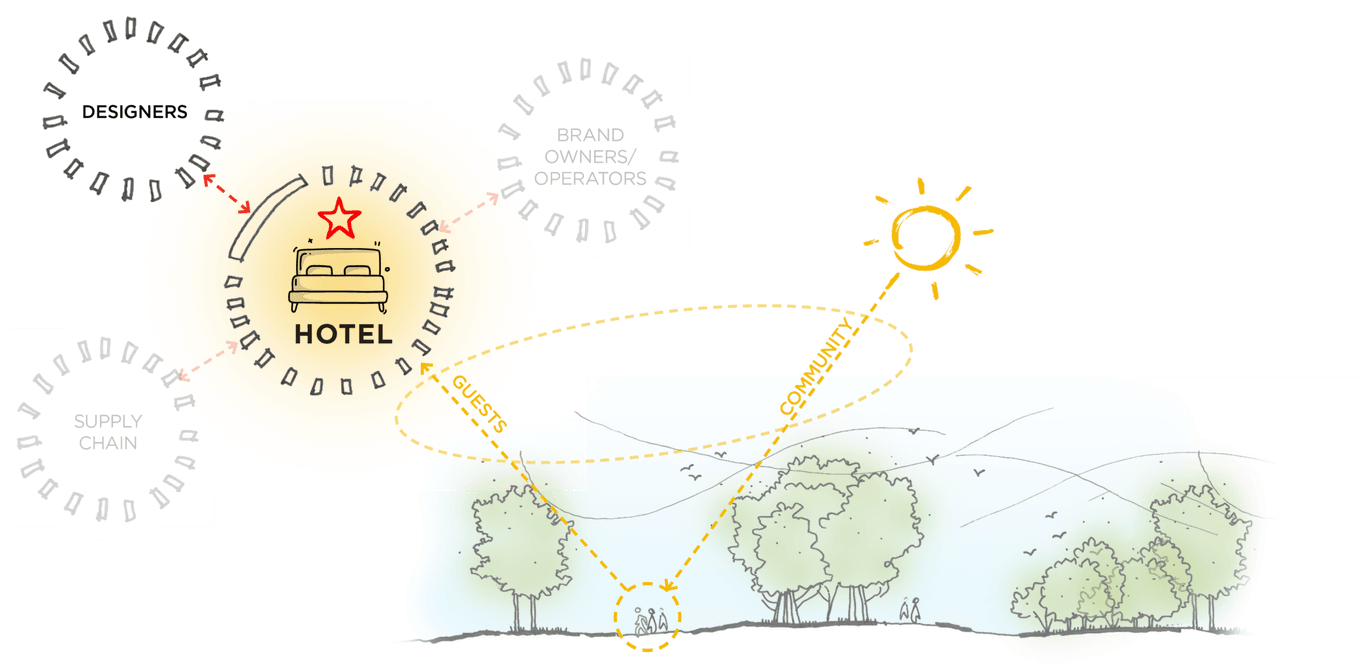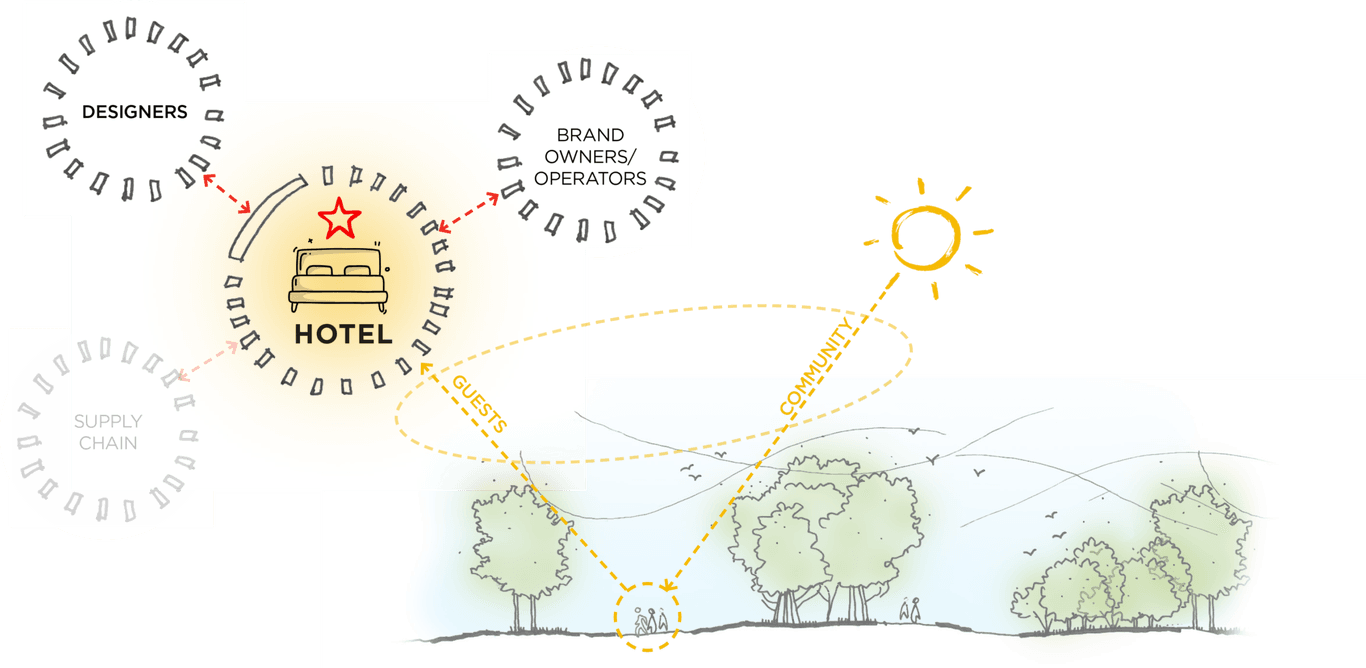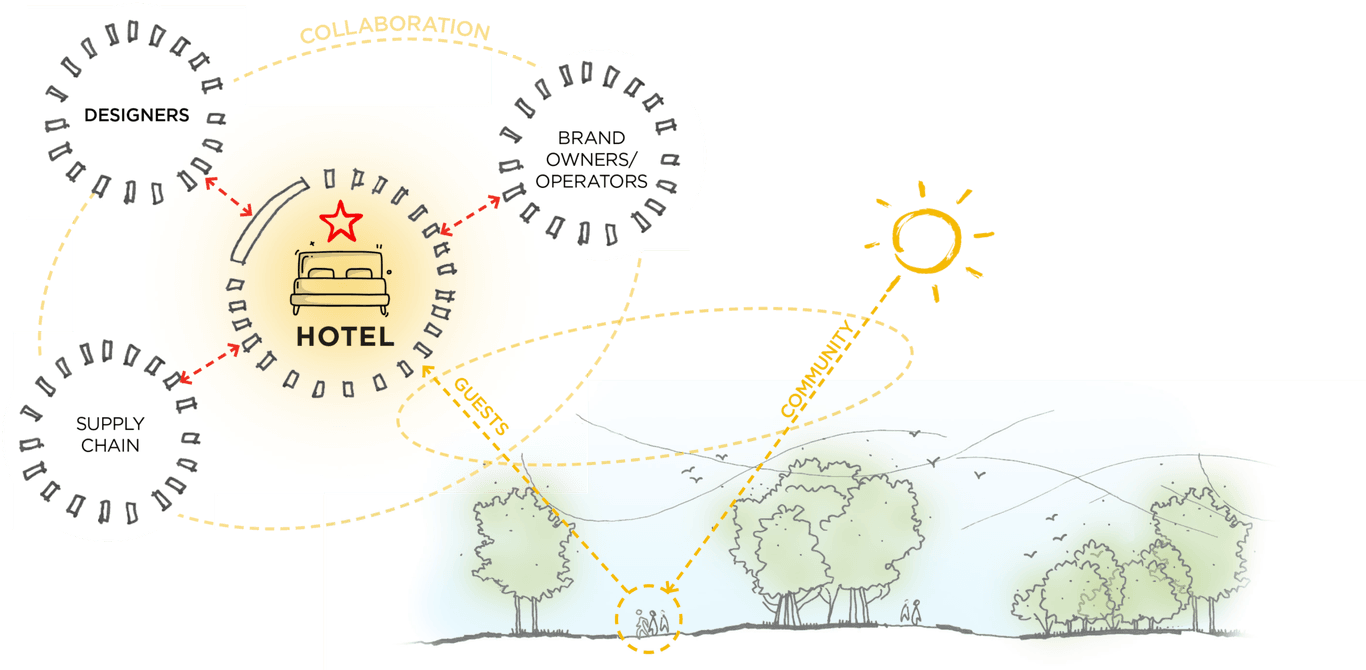
Sustainable Design in the Hospitality Sector
Sustainable Design in the Hospitality Sector
A sustainable future is not something that will just ‘arrive’, we need to continue to work on the journey, not fixate on the final destination. To avoid being overwhelmed, we should set targets, both short and long-term. There is a real passion for change in the industry, so it is imperative to take big, bold steps. Here, she outlines the steps that different parties must take to drive change.
The market is changing and the customer is in the driving seat
As designers in the hospitality sector, we increasingly find that user experience is a driving force. The consumer is pushing for a sustainable agenda, but this is complex. There are many different stakeholders that deliver the hotel “experience” and therefore each needs to buy into and subscribe to sustainable principles appropriate for them, and also for the wider good of the sector.
Below is a list of what different stakeholders must do to prioritise sustainable design.
DESIGNERS
Designers are absolutely integral to a hospitality development. Here are some points that we need to take into consideration.
Education: It’s essential that we share our knowledge and core values with the public. We need to explain how we will achieve our targets by creating a clear path and explaining the steps that we will take along the way.
Collaboration with the community and supply chain: It’s important to engage with the local community at an early stage to offer a more integrated approach to the surrounding neighbourhood. Be eager to work with suppliers who have full knowledge of cradle-to-cradle manufacture, and who run programmes such as take-back schemes, which create a culture of sharing and learning.
Smart Design: Design needs to be flexible and adaptable so that it stands the test of time. It must also ensure safety, comfort and high operational standards.
Embodied and Operational Carbon: Responsible practice guides must be woven into every stage of the building's life, from design to construction and, finally, operation.
Circular Design Strategy: “Repurpose and reuse.” The building and its content need to be designed for a second life. Designers must consider the end-of-use and end-of-life scenarios and offer the ability to disassemble the design.
BRAND OWNERS/OPERATORS
User needs, such as requests for carbon-neutral hotel rooms, increasingly drive major hotel brands to push even further. 85.6% of travellers say they would pay more for an eco-friendly choice of hotel. Although operators already have strong, sustainable agendas and values incorporated into their brand standards more must be done to keep up with current affairs.
The following steps could also be taken or improved further:
Knowledge phase: Provide easy responsible facts within the rooms and public areas that could further educate the guests and increase their participation, for example, Eco Labels.
Cultural and social aspects: Support local businesses and communities and help facilitate meaningful placemaking within the bounds of the hotel environment.
Adaptability: Request flexible and adaptable designs from the design team and incorporate the same perspective into standard plans.
Materials: Research alternative sustainable, innovative materials fit for purpose with a level of sophistication that could achieve safety standards.
Data Collection: Expand the data collection capability from live projects and turn the information into a meaningful model that would provide responsible ways for the environment.
Maintenance Cycle: Assess the maintenance cycle by extending the timescales of the refurbishment program through the use of durable materials and timeless designs.
The Economy of Scale: Develop close relationships with nominated suppliers who provide flexible business models, including leasing and circular options. The brand's standards must highlight essential items that must be procured, which will encourage meaningful conversations with investors concerning cost efficiencies and sustainability measures.
SUPPLY CHAIN
Suppliers can positively impact sustainability and secure future work by developing a good reputation for such initiatives.
Collaboration and education: Communication is key between suppliers and designers. Demonstrate knowledge of cradle-to-cradle procedures, run programmes such as take-back schemes and create a culture of sharing and learning.
Material assessment: Research further innovative materials that are fit for purpose, with a level of sophistication that will achieve safety standards. Minimise the fabrication of new materials and use recyclable core materials that could be applied in various ranges. Source ethical base materials by collaborating with local communities.
Data Collection: Gather data to map the history of a new product and provide certificates to ensure durability, safety and circularity, which would be easily accessible.
Circular Economy: Encourage circular business and lease model options for designers and brand owners/operators.
Many positive steps have been taken by the various parties involved in the hospitality sector, to influence sustainable practices, but we can all do more. By collaborating, and continuing to learn, we can put positive steps in place to influence current and future projects.
--
Chapman Taylor has in-depth experience in designing a wide variety of hospitality developments ranging from major resorts with multi-hotel and residential accommodation to 5-star hotels in major cities around the world. We have a clear understanding of the major aspects of the customer experience which we carefully incorporate into our design proposals and we take a Responsible Design approach in all that we do.

